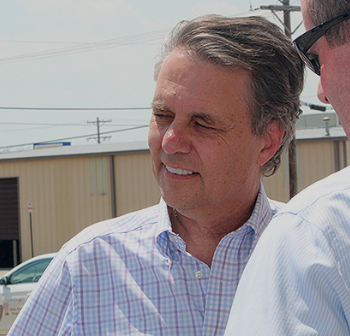
Hays Post
Gov. Jeff Colyer and Lt. Gov. Tracey Mann focused on ag issues when they made a stop in Hays on Wednesday during their Get Out the Vote statewide tour.
Colyer and Mann made multiple stops across the state Wednesday, talking to many farmers about the state of crops and trade.
Speaking in front of the grain elevator at Midland Marketing on Ninth Street, Colyer said he is working on opportunities for Kansas farmers to market their products.
“We have passed legislation on everything from weeds to industrial hemp to be produced,” he said. “Talking to farmers about trade, a lot of people are talking about trade and prices. Very early on when some of the trade disputes happened, for example, when China imposed 179 percent tariff on Kansas sorghum, we called in the Chinese consult general, we talked with Kansas farmers and ranchers, and that is one of the things they have actually backed off on.”
The state has worked with the White House on the trade issues, he said, but it is also trying to open up new markets.
“We have been dealing with, for example, Indonesia, Japan and a number of other countries on how to expand Kansas markets there,” Colyer said. ‘They know we are a great supplier. We are more affordable than anybody else. We are the best value and certainly the best product.”
Colyer said the farmers have told him they think a $12 billion farm aid package announced by the USDA on Tuesday is a good first step in helping producers overcome damage done by the tariffs.
“They know we need to have free and open markets, but they also know that we need to know that our farm and agriculture communities are doing well,” Colyer said. “It is a tight situation. Everybody knows that.”
Colyer said the state is trying to find ways to add value to products. He used the example of milk and cheese processors that have come to the state.
“We know agriculture is the center of the Kansas economy, and we have been talking to some folks about some new agriculture opportunities.”
Travis Brunner, Midland Marketing commodity risk manager, mentioned growing and marketing white wheat in the state as an example of a value-added product.
Mann said the state has tried to make moves such as expanding grazing rights on CRP land to deal with issues of drought in other areas of the state.
Colyer said managing water resources was also essential to the success of agriculture and the future of the state. He cited a Local Enhanced Management Area, or LEMA, in Hoxie that had successfully used technology to reduce water usage while maintaining incomes.
Colyer, who grew up in Hays, said he and Mann’s goal of the tour was to listen to voters.
“It is really to get home and talk to folks about what is happening in Kansas,” he said. “We are starting to solve problems. We have upgraded our credit rating. Our credit outlook is up for the first time in years. The economy is starting to move. Our unemployment rate is 3.4 percent. Our focus is to make sure we have good schools and great education, so we have an educated workforce. But we have to have low taxes and low costs, and that is what we are doing.”
Colyer touted the school funding package that was approved by the Legislature this spring that will add $500 million in education over five years. The Supreme Court issued a decision following the Legislature’s session that said more money needs to be added to the school funding formula. The state has until next June to comply with the latest order.
“What the focus will be is getting it into the classrooms,” Colyer said of the additional education funds. “We require outcomes in this. And by stair-stepping it in, there’s no tax increase. The schools can also absorb it better, and our goal is to see that in better teachers and better pay and making sure kids have those opportunities.”
He also said the state has dedicated more money to technical education to position Kansans for higher-paying jobs.
Colyer said the Kansas economy is starting to grow, and that will help some of the state’s budget woes.
“Wages are up 3.1 percent. We have more than 20,000 new jobs in the last 12 months,” he said. “If we can keep moving with these higher quality jobs and getting more money in people’s pockets, that makes a big difference. That flows through the entire economy. Our revenues are up over estimates, but the big thing is more people are working in Kansas, and we want them working at better jobs. That is what we are going to be focusing on.”
